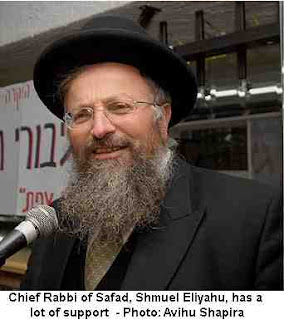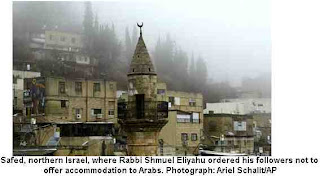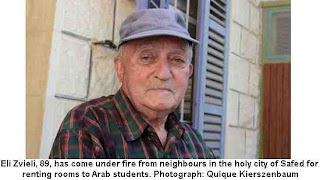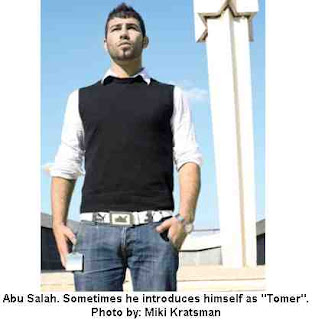55% of Israelis Back Safed Chief Rabbi’s Ruling Forbidding the Renting of Flats to Arabs
A month ago, Gideon Levy published in Ha’aretz, an article about a ruling by the chief rabbi of Safed, Shmuel Eliyahu, that Jews were forbidden to rent homes and flats to non-Jews. For a month Benjamin Netanyahu, Israel’s Prime Minister kept quiet for fear of upsetting his religious coalition partners.
However the story started to take off internationally especially when Eli Tzvieli, an 89 year old Holocaust survivor, was threatened with having his house burnt down for renting to Arabs. Prime Minister Netanhayu was left with no option but to condemn the ruling having remained silent through similar utterances. We should be under no illusions that Netanyahu’s words are mere diplomatic verbiage by someone who hasn’t the slightest difficulty with the razing Arab villages to the ground, who supports loyalty oaths for Israel’s Arabs and their transfer out of Israel, the settlement and eviction of non-Jewish inhabitants of Jerusalem as well as the panalopy of other measures intended to ‘Judaise’ Israel and which are directed against Israeli Arabs. A Jewish settler state is inevitably a racist state as it demonstrated at its birth when it expelled some ¾ million Arabs.
A poll in Israel’s most popular daily paper, Yediot Aharanot, tells us the real story. That 55% of Israeli Jews, including 41% of secular Israeli Jews, support the ruling not to rent to Arabs in Safed. This is the true measure of Israeli racism and its deep, popular roots.
Despite all their posturing about ‘delegitimation’ and apartheid, the fact is that the Israeli state is now shedding its mask.
If Arabs were to say such things in Israel they would be arrested and if employed by the state dismissed. Yet nearly 300 municipal chief rabbis have signed up to the statement, whilst still being employed by the Israeli state and not a thing has been done about it.
Israeli propaganda in the West would have you believe that it is the Arabs who hate the Jews whereas in fact the exact opposite has always been true in Palestine.
The uproar about Safed comes after the scandal of the publication of Torat HaMelech, the King’s Story, by Lubavitch Rabbi Yitzhak Shapira (Lubavitch is a fast growing sect with luminaries such as the Chair of the United Synagogue Rabbis in Britain, Rabbi Schochet, as members). Shapira’s masterpiece explains why the killing of non-Jews is allowed, including infants and babies. On that occasion Netanyahu and the Zionist movement said absolutely nothing.
Safad however, became an international story and that led Yad Vashem, the Zionist Holocaust Propaganda Museum issuing a rare statement of condemnation. Built adjacent to the ruins of Deir Yassin, a village whose inhabitants were massacred in 1948, YV has sacked staff members who have even pointed out the fact that a memory to the slain of the holocaust is sited next to the butchery of Deir Yassin, where over 100 Arab women, children and men were slaughtered.
Tony Greenstein
Ynet – published 15.12.10.
Poll: 55% back rabbis’ anti-Arab ruling
Survey shows 41% of secular Israelis support municipal religious leaders’ call not to rent apartments to non-Jews, as do 64% and 88% of Israel’s traditional and haredi Jews, respectively
A significant segment of Israel’s adult Jewish population agrees with a religious ruling forbididng Jews from selling or renting apartments to Arabs or other non-Jews, according to a recent survey commissioned by Ynet and the Gesher organization.
The controversial ruling was issued by a group of 50 municipal rabbis.
Some 55% of those polled said they agree with the ruling; 26% of the respondents said they agree with it for the most part; 13% agree with the ruling to “some degree,” while 42% disagree with the rabbis’ call entirely.
The survey indicated that more than half of Israel’s secular Jews (about 53%) oppose the ruling, while 41% of them agree with it to some extent (18.4% support the ruling to a large extent; 12.1% agree with it to a certain extent; 13.6% back the rabbis’ ruling to a small extent).
Among Israel’s traditional population, 64% agree with the ruling and about 30% do not agree with it at all, the poll indicated.
The survey further showed that some 66% of religious or haredi Israelis support the call not to rent or sell apartments to non-Jews, 22% of them agree with the ruling to a lesser extent, while only 10% do not agree with the rabbis’ ruling at all.
In addition, some 58% of those polled said they were against dismissing the rabbis over the ruling, while 42% support such a move.
Asked what they would do in case an Arab family planned to purchase or rent an apartment in their neighborhood, some 57% of the respondents said it would not bother them, 24.5% said they would act or consider acting to prevent the Arab family from moving into their neighborhood, while 7% said they would move out.
Analyzing the results according to religious affiliation shows that 69% of Israel’s secular Jews would not have a problem living near Arabs; 52% of the traditional respondents and 15% of the haredi respondents also said they wouldn’t mind having Arab neighbors. However, some 24% of the secular respondents said they would act or consider acting immediately to prevent Arabs from moving into their neighborhood, as would 31% of the country’s traditional Jews and 78% of the haredim.
‘Not about halacha’
Only 6% of Israel’s secular Jews and about 5% of its religious and ultra-Orthodox citizens would consider moving out of their neighborhood should an Arab family move in.
Gesher General Manager Ilan Gael-Dor said the fact that close to 60% of Israel’s Jews agree with the rabbis’ call not to sell or rent out flats to non-Jews “expresses the desire of most Israelis to preserve the country’s Jewish character, but what about democracy? How does a Jewish and democratic state treat a minority group?
“In my opinion, the rabbis erred when they made the issue into a halachic one. This debate is about the characteristics of the Jewish-democratic state. The agreement with the rabbis does not stem from halachic considerations,” he added.
The survey was conducted among 500 respondents constituting a representative sample of the adult Jewish population in Israel. The maximum sampling error was 4.4%.
Haaretz, 07.12.10
Netanyahu slams top rabbis’ call to forbid renting homes to Arabs
The prime minister says such things cannot be said in a democratic country, emphasizes that anti-Arab declarations are not acceptable in Israel.
By Barak Ravid and Chaim Levinson
Prime Minister Benjamin Netanyahu on Tuesday harshly condemned a move by a number of leading rabbis who signed on a ruling to forbid renting and selling homes to Arabs.
“How would we feel if we were told not to sell an apartment to Jews?” asked Netanyahu. “We would protest, and we protest now when it is said of our neighbors.”
Earlier on Tuesday, a number of top rabbis who signed on to a religious ruling to forbid renting homes to gentiles – a move particularly aimed against Arabs – defended their decision with the declaration that the land of Israel belongs to the Jews.
“Racism originated in the Torah,” said Rabbi Yosef Scheinen, who heads the Ashdod Yeshiva. “The land of Israel is designated for the people of Israel. This is what the Holy One Blessed Be He intended and that is what the [sage] Rashi interpreted.”
Speaking at the National Bible Contest for adults, Netanyahu emphasized that such declarations are not acceptable in Israel.
“Such things cannot be said, not about Jews and not about Arabs. They cannot be said in any democratic country, and especially not in a Jewish and democratic one. The state of Israel rejects these sayings.”
Education Minister Gideon Saar also related to the rabbis’ letter during his speech at the Bible contest on Tuesday evening, saying that the Torah commands one to have good relations with Gentiles.
Concurrently, dozens of people gathered in front of Independence Hall in Tel Aviv for a spontaneous demonstration against the rabbis’ letter forbidding the sale or rental of properties to Arabs or other non-Jews.
A number of cultural figures were present at the demonstration, including Meretz MK Nitzan Horowitz. Horowitz said, “These people receive a salary from the state and break the law. As a Jew and an Israeli, I am embarrassed that these men are municipal rabbis.”
Horowitz continued, “There is no connection between what they preach, and Judaism. In the Declaration of Independence [of the State of Israel] it states that everyone has equal rights. We see a wave of fascism and racism that is trying to cut off sectors of Israeli society.”
Gilad Kariv, head of the Reform Judaism movement in Israel, said, “The fire of racism will completely destroy Israeli society. If there is a lesson to be learned from what took place over the weekend, it is the danger of complacency. The rabbinical decree is abominable, and desecrates the seal of God that lies within every human being.”
The director Ibtisam Mara’ana said, “Instead of lighting a Hanukkah candle, I would like to light a memorial candle and say Kaddish, the Prayer of the Dead, for the democratic state that we once had.”
Mara’ana continued, “The rabbis took advantage of the state and usurped it for themselves. It is not only the state of the Jews. Today it is against Ibtisam the Arab, and tomorrow against Esther the lesbian, and next week against a woman with her hair exposed.”
On Tuesday morning, it was revealed that dozens of Israel’s municipal chief rabbis signed on to a ruling urging Jews to refrain from renting or selling apartments to non-Jews.
In their ruling, the rabbis called on the religious community to voice support Safed Chief Rabbi Shmuel Eliyahu, who could face trial for incitement against Arabs for initiating the move against renting to gentiles.
Minority Affairs Minister Avishay Braverman has also asked Justice Minister Yaakov Neeman to begin the process of suspending Eliyahu immediately from his post as municipal rabbi.
Politicos from the national religious sector believe that the mass of prominent figures who signed on to the ruling – all of whose salaries are paid by public funds – will send a message to the attorney general to take Eliyahu’s position seriously.
Upon news of the religious ruling, Meretz faction whip Ilan Ghilon immediately asked the attorney general to dismiss each of the rabbis who had signed their names.
“We are witnessing an epidemic of racism and xenophobia and we must act firmly,” he said.
Deputy Knesset chairman MK Ahmed Tibi decried the letter as a “mass crime [committed] by a group of racist rabbis who should be given intensive course in Jewish history.”
“The entire group should be tried for “incitement to racism,” added Tibi, “Muslim clerics have recently been tried or fired from their jobs for much less but the rabbis are able to pursue their unruly behavior without concern.”
Among the rabbis that signed the letter are the following: Yaakov Edelstein of Ramat Hasharon, Yosef Sheinin of Ashdod, David Wolpe of Rishon Letsion, Avraham Margalit of Carmiel, Simcha Hacohen of Rehovot, Yitzhak Yaakobovitch from Herzliya, and David Tsedakah from Pardes Hannah.
A campaign of racism and anti-Arab incitement is turning one of Israel’s holy cities into a ticking bomb
Ha’aretz,Published 10:39 12.11.10
By Gideon Levy
The telephone rings. “Hello, this is Mustafa, I’m calling about the apartment.” The response comes quickly and emphatically: “No, it’s already been rented.” Or, “I only rent to women,” or “I only rent to families.” Or, in an angry tone: “Heaven forbid, do you want to stop me from reading the Torah on Shabbat,” or “I’m afraid of the rabbis.”
For an entire hour, student Mustafa Shahin, a resident of Sakhnin who studies sociology and human resources at Safed College, made telephone inquiries – in vain. Because he is an Arab, the rental listings on the college bulletin boards are irrelevant. Mahmoud Abu Salah, Shahin’s representative in the student union (there are a total of eight representatives, but only one is an Arab ), says that he sometimes introduces himself on the phone as “Tomer” to get the conversation started. Now everyone has started calling Mahmoud “Tomer.” But that doesn’t mean people want to rent to Arab college students in Safed.
The city is roiling: It recently hosted an “emergency conference” of 18 rabbis and 400 of their followers on this issue. There was an armed attack on an Arab student apartment. A Jewish legal ruling was handed down by the city’s chief rabbi, Shmuel Eliyahu. Mayor Ilan Shohat and veteran resident Eliyahu Tzvieli, who rented an apartment to Bedouin students, have received threats. The message is: Arabs, go home.
In response to plans for establishing a medical school in Safed, flyers were circulated last week by some sort of “campaign headquarters,” declaring: “The smokescreen called a medical school obscures an evil scheme: to establish a refugee camp for psychotic, sadistic and debased Arabs, whose deceptiveness is, and always has been, aimed at tempting [Jewish women] and cruelly abusing them. On orders of the great rabbis of Safed, may they be blessed with a long life, we declare our protest and vehement resistance, and reiterate that it is forbidden under the law of the Torah to offer these people apartments for sale, rent, work or any form of entry. Our city will not succumb to wanton behavior – go back to your own locales and do not defile our camp.”
The language of this flyer slams the Safed College Internet site, which touts “a city that blends academia, tradition, kabbala and a magical atmosphere.”
Abu Salah reads the flyer and puts it in his pocket without uttering a word. For the time being, he and his peers are showing restraint, but a time bomb is ticking here. Safed is a war story in the making.
Kabbalist Rabbi Isaac Luria was born on Safed’s slopes, and Palestinian Authority leader Mahmoud Abbas was born nearby. Today, the town’s artists’ quarter is being snuffed out by ultra-nationalist zeal. On Jerusalem Street, where Safed College is located, there is a Rav Hesed supermarket; a Galgal Hakodesh store that sells Jewish religious articles; and a furniture store with a special “bride-and-groom” deal for furnishing an entire apartment for NIS 8,888.
Safed College, operated under the auspices of Bar-Ilan University, has 1,700 students, and the whole campus seems to speak Arabic. Indeed, when we visited the institution last week, it seemed to have an absolute Arab majority. The most obvious exceptions were a policeman and a prison warden, both enrolled as students, and two lecturers who wore skullcaps and ritual fringes. Strolling around the sun-drenched campus, with its olive and cypress trees, were dozens of Arab students from the Galilee. Some, but not all, of the female students wore traditional head coverings; male students had hair gel. On the lawn, next to the modest library, a student set down his jacket, and kneeled to pray in the direction of Mecca.
The whole area is full of surreal contradictions: There is the bearded driver who shouts threateningly, in Arabic, at what he calls “el Yahud [the Jews]” – a group of Arab students, who cross the street and stare at him apathetically. The campus seems tranquil, while the city seethes with racist hatred. One sees Bratslav Hasidim and newly Orthodox and other pious Jews roam the streets along with hijab-clad, traditional Muslims.
A recent editorial, titled “The Ishmaelites,” in the Hamevaser newspaper proclaimed that one of the city’s rabbis conducted an inquiry and discovered that funding from the European Union and Saudi Arabia finance the college’s Arab students.
“I wish they did support us,” reflects the student activist, Mahmoud Abu Salah, aka Tomer, with a wistful smile. He embodies several contradictions: He claims that he served in the Israel Defense Forces as an undercover soldier, yet he is the student union delegate of the “Arab sector” (an Israeli expression ), and his dream is to become the state comptroller or an ambassador. “I don’t have any problem representing the state – this is my state,” he says wanly.
Not exactly minted in the “Danny the Red” mold, the young man allowed himself to be photographed in a triumphant pose, alongside the memorial to the “Liberators” who expelled his forefathers from the city. A second-year law student who already has a degree in social work from the college, he wears preppy white shoes and a Puma belt.
Abu Salah has already resided in four apartments in Safed. At present, he is compelled to commute each day from his village because it is nearly impossible for Arabs to find a room to rent in the city. Out of the college’s 900 Arab students, he says, only a few live in rented apartments, not including the 120 who live in the dormitories.
On a recent Saturday, Abu Salah met MK Ahmed Tibi in Jenin’s market, and asked the parliamentarian not to visit the college.
“We don’t need Arab MKs here,” he explains now. “We keep things quiet on our own. I think the college should take care of things here. I don’t want to organize demonstrations; I want to keep things calm. I stay silent, but the college has to do something. That’s what I told the college president. We have never encountered racism on the campus grounds – so they [Knesset members] can come make the rounds in Safed, but shouldn’t come here.”
This week Abu Salah met the Arab students’ representative at Netanya Academic College, and learned that it is also nearly impossible for Arab students in that coastal town to rent an apartment. He says he has Jewish friends who signed a rental contract in the name of Arab students. But after it was discovered, the landlord was threatened; he was told that his own house would be burned down if Arab tenants were to remain in the Safed apartment.
Abu Salah: “Rabbi Eliyahu thinks that we want to return Safed to the Arabs. They think that we want to remain in the city after our studies. But only a few [Arab students] remain here on Saturdays. An [Arab] student comes here solely for the purpose of studying. After that he’ll go anywhere, to get the hell out of here – what is there for us in such a poor town? A student spends an average of NIS 50 a day in the city, not including rent. We help Safed’s economy. I’m not even talking about the money they make from parking fees. Most come to study here, and are not looking for trouble. Nobody comes looking to compile a criminal record … They [those who object to the Arab students] want us to organize; they want to remove us from here. But we want to be smarter than that, to show them that we exist, without causing an uproar,” explains Abu Sabah.
During his studies, he says, he has been employed in two local hotels, Rimonim and Canaan Spa, working as a shabbas goy – someone who assists devout Jewish guests on the Sabbath. He has provided similar services for neighbors: “I would return home, and a neighbor would tell me, ‘It’s cold.’ At first, I didn’t get it. What was I supposed to do, warm him up? But they spoke to me with gestures, so that I’d understand what they meant and light their furnace on Shabbat.”
He also has stories of residents spitting at Arab students, and of students entering stores and being told that they were “closed.” He has heard chants on streets, like: “An Arab is a son of a bitch.” I asked him how he would respond were someone to call him a dirty Arab. “I would ask him, am I really dirty? I take a shower twice a day and dress better than you,” Abu Salah quips.
At Hummus Atika, an ultra-Orthodox waiter served a smooth, kosher version of the chickpea paste, which was actually pretty tasty. The restaurant walls were covered with colorful portraits of past and present rabbinical sages, including the late Chief Rabbi Mordechai Eliyahu, father of the Safed rabbi who is spearheading the Arab expulsion.
Haaretz’s Galilee correspondent, Eli Ashkenazi, told us he heard recently from Eliyahu Tzvieli, 89, the resident who was threatened after he rented an apartment to Bedouin students, that an Arab student entered a falafel joint Tzvieli rents to a Jewish proprietor, and ordered a meal. “I’ll give you poison,” was the response. Tzvieli tried to cancel the rental contract for the falafel stand, but was unsuccessful.
The student Mustafa Shahin lived last year in rental apartments located off Safed’s main pedestrian thoroughfare, and also in the Canaan neighborhood. This year, he spends 70 NIS a day on bus travel to and from his home. He has phoned dozens of landlords, explaining, “This is Mustafa, I’m calling about the apartment.” He was always rejected.
He phones a man named Viktor, who has an apartment for rent.
“Only women,” says Viktor.
“But I live alone,” pleads Mustafa. “I don’t make trouble and keep quiet.”
Viktor responds: “I have a problem. I would take you, but there are the rabbis. They give me problems. I would rent to women, I’m not afraid, but not to men. Good luck, Mustafa.”
Then there was a “fully furnished” apartment.
“Good afternoon, this is Mustafa, I’m calling about the apartment,” the student says.
“Try calling at night, I’m driving right now,” replies the landlord.
After several more fruitless phone calls, Mustafa gives up. Some students come up to us and relate their own experiences. A college bulletin board lists some living-room furniture for sale, and a wooden kitchen cabinet. Mustafa calls up, but is told the furnishings are no longer for sale.



